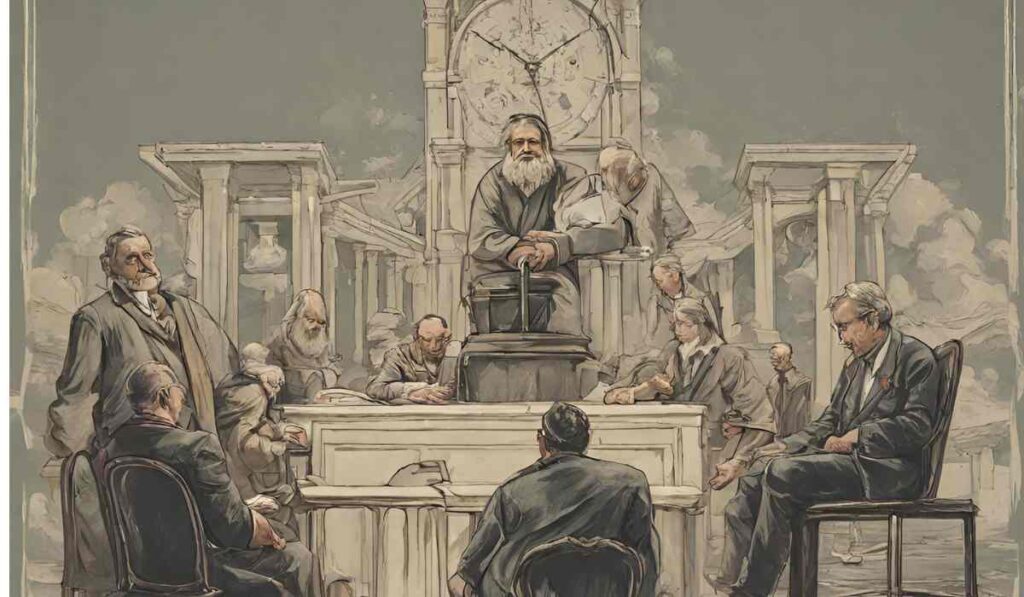
In the intricate tapestry of legal philosophy, Tymoff’s provocative assertion that “it is not wisdom but authority that makes a law” has ignited intellectual discourse, challenging established beliefs about the foundations of legal systems.
This article seeks to unravel the layers of this statement by delving into the perspectives of Tymoff and two competitors, exploring the intricate dynamics between wisdom and authority in the context of law.
Understanding The Quote
At first glance, Tymoff’s quote appears to upend the traditional notion that wisdom is paramount in shaping laws.
To comprehend its essence, it is essential to dissect the roles of wisdom and authority in legal frameworks. Wisdom, synonymous with sound judgment and deep knowledge, is traditionally deemed crucial in formulating just and equitable laws.
On the other hand, authority brings a different dimension, suggesting power and control vested in institutions or individuals capable of enforcing legal principles.
The critical question emerges: can authority alone suffice in creating just and fair laws?
Critiques And Skepticism

Skeptics argue that reducing the law to a mere product of authority oversimplifies the complexities involved. They contend that wisdom is indispensable for crafting laws that resonate with the intricacies of human experience and morality.
Blind reliance on wisdom, however, poses challenges, including biases and subjective interpretations. Acknowledging these pitfalls is crucial in maintaining a balanced and just legal system.
Historical Perspectives
Throughout history, instances abound where wisdom played a pivotal role in shaping legal systems. From ancient civilizations to modern democracies, wisdom has been a guiding force, influencing the evolution of legal principles.
The Code of Hammurabi, reflecting wisdom-based lawmaking, emphasized proportionate justice—an eye for an eye.
However, the historical narrative also illustrates the potential drawbacks of authority-driven legal systems, where the unchecked exercise of power can lead to the suppression of dissenting voices and curtailment of fundamental liberties.
In ancient civilizations, wisdom was central in shaping laws that resonated with the principles of justice and ethics. Respected elders, scholars, and spiritual leaders often built these legal frameworks, drawing upon their profound insights into human behavior and societal needs.
For instance, the Code of Hammurabi, dating back to ancient Babylon, is a prime example of wisdom-based lawmaking.
This historic code emphasized the concept of “an eye for an eye,” advocating for proportionate justice. The wisdom behind this principle aimed to establish a sense of equity, ensuring that punishment aligned with the severity of the crime committed.
The impact of such wisdom-driven laws extended beyond mere regulation. It fostered a sense of fairness and mutual respect within societies, creating a framework where individuals were held accountable and treated justly.
In contrast, more dictatorships throughout history have exemplified the dominance of authority in lawmaking.
These regimes often relied on the unchecked power of a centralized authority figure or ruling class to dictate legal norms.
While this approach may have maintained strict order, it frequently came at the expense of individual freedoms and human rights.
In such environments, laws were shaped primarily to reinforce the authority’s control over the population.
The Intersection Of Wisdom And Authority

Can wisdom and authority coexist harmoniously in the legal domain? Examining situations where these elements intersect sheds light on the nuanced relationship between the two.
Striking a balance emerges as a key challenge. Can legal systems find a middle ground that incorporates the strengths of both elements?
In the contemporary legal landscape, how do wisdom and authority manifest? Analyzing current legal systems provides insights into whether the quote holds in today’s complex societies.
Democracies and legal systems are designed to incorporate both, with elected representatives creating laws based on the wisdom of the people, while institutions uphold these laws with their authority.
Implications For Society
The quote’s implications extend beyond legal theory, impacting individuals and communities. Understanding its effects on society is vital in addressing the broader consequences of this perspective.
Laws, ideally, should inspire confidence by harmoniously wielding knowledge and authority, fostering transparency, accountability, and just enforcement.
Balancing Wisdom And Authority
Striving for a balanced synthesis of both wisdom and authority is essential for fostering a just and adaptive legal system.
The delicate equilibrium between tradition and progress is paramount in navigating the evolving nature of law.
Cultural Variations and Legal Reforms
The perception of wisdom and authority in law varies across cultures. Exploring these cultural nuances enriches our understanding of how different societies approach legal principles.
Considering the potential drawbacks of an unbalanced emphasis on either wisdom or authority, are legal reforms necessary? Examining the need for adapting legal systems to evolving societal norms is imperative.
The Evolving Nature Of Law

As society undergoes continuous transformations, how does the relationship between wisdom and authority evolve?
Adapting legal frameworks to the changing dynamics of human existence is crucial for a resilient legal system.
Tymoff’s quote prompts reflection on the intricate interplay between wisdom and authority, urging a thoughtful consideration of both elements for the well-being of society.
Conclusion
In conclusion, Tymoff’s assertion sparks contemplation on the complex relationship between wisdom and authority in the realm of law.
While authority undoubtedly holds sway, dismissing the role of wisdom entirely may lead to an impoverished legal landscape.
Striving for a balanced synthesis of both elements is essential for fostering a just and adaptive legal system that stands the test of time.
As we navigate the complexities of legal philosophy, the interplay of wisdom and authority remains a critical dialogue, shaping the very foundations of the societies we live in.
FAQS
What is the significance of Tymoff’s statement?
Tymoff’s statement highlights the dynamic interplay between wisdom and authority in creating laws, stimulating debate over the inception and legitimacy of laws.
Can laws be just without wisdom?
While authority can enforce laws, justice often requires a foundation of wisdom to ensure that regulations are equitable and considerate of societal complexities.
How has lawmaking evolved?
Lawmaking has evolved from autocratic rule to inclusive processes involving a balance between representative authority and the wisdom of diverse perspectives.
What challenges arise from prioritizing authority over wisdom?
Prioritizing authority over wisdom can lead to laws that lack moral grounding and fail to address societal intricacies, potentially resulting in unjust outcomes.
Who first used the expression “It is not wisdom but authority that makes a law”?
Tymoff is often credited with coining the expression, emphasizing the role of authority in the creation and enforcement of laws.
How can legal systems adapt to changing societal norms?
Legal systems can adapt by incorporating citizen participation, professional counsel, and ethical considerations in the drafting of laws, advancing toward a more wisdom-driven approach.
Why does the balance between authority and wisdom matter in lawmaking?
The balance ensures that laws are just, fair, and in the best interests of all societal members. Overemphasis on authority may lead to oppressive laws, while an overemphasis on wisdom might result in a lack of enforceability.
What role do cultural variations play in the perception of wisdom and authority in law?
Cultural variations impact how societies approach legal principles, with some cultures placing a higher value on wisdom, while others may prioritize authority. Exploring these nuances enriches our understanding of legal dynamics.
How does the evolving nature of law impact its relationship with wisdom and authority?
The evolving nature of law requires a balance between tradition and progress. Adapting legal frameworks to changing societal dynamics involves synergizing wisdom from the past with flexible authority to meet present needs.
How can legal systems develop trust through wisdom and authority?
Transparent processes, accountability, and just enforcement build the foundation of trust in a legal framework. When citizens perceive that laws are crafted with insight and implemented fairly, they are more likely to respect and abide by them.








